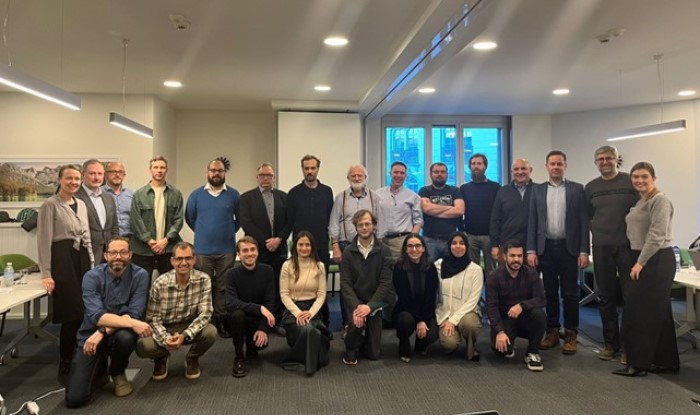Foreign Information Manipulation and Interference (FIMI) represents a pressing challenge for the European Union, undermining trust in democratic processes and impacting security both domestically and internationally. The ATHENA project, launched in response to this threat, organized a face-to-face meeting in Brussels on February 12, 2024, bringing together project partners to discuss progress, challenges, and project objectives to combat FIMI effectively.
 Participants of the ATHENA project’s face-to-face meeting in Brussels. Some people are absent due to early departures of flights. Photo: Elodie Rouge.
Participants of the ATHENA project’s face-to-face meeting in Brussels. Some people are absent due to early departures of flights. Photo: Elodie Rouge.
Foreign Information Manipulation and Interference (FIMI) poses a growing political and security challenge to the European Union, eroding trust in democratic institutions and impacting polarization within the EU. It impacts the EU’s policy implementation both domestically and internationally and can fuel political violence in conflict-prone regions, undermining global peacekeeping efforts. Foreign actors employ a range of evolving Tactics, Techniques, and Procedures (TTPs), often integrating them with cyber security and hybrid threats to manipulate and disrupt the information environment. (EEAS 2021.)
FIMI refers to a pattern of behavior, which poses a threat or holds the potential to negatively impact values, procedures, and political processes. This manipulative conduct is deliberate and coordinated, with actors ranging from state entities to non-state actors and their proxies, both within and beyond their territorial boundaries. (EEAS 2021.)
FIMI poses a threat to the security, stability, and sovereignty of the EU and its member states. It can also have a negative impact on the social cohesion, human rights, and fundamental values of the EU. Therefore, it is essential to develop effective and coordinated responses to counter FIMI and protect the EU’s interests and values.
This is the main goal of the ATHENA project, a €3 million, three-year project launched in November 2023, representing the EU’s strategic response to the escalating threat posed by FIMI. ATHENA has a consortium of 14 partners from 11 countries, including universities, SMEs, law enforcement academy and an industry organization. Laurea University of Applied Sciences is the only Finnish partner in the project. The project is funded by the Horizon Europe, the EU’s framework programme for research and innovation.
The main goal of ATHENA is to examine at least 30 instances of FIMI, analyzing the tactics, techniques, and procedures (TTPs) used by perpetrators. By gaining a deep understanding of these methods, ATHENA aims to develop novel and robust countermeasures while evaluating their societal implications.
On the 12 February 2024, the ATHENA project convened a face-to-face meeting in Brussels to address the pressing issue of FIMI. At the meeting, there were four people present from Laurea: Kaisa Hytönen, Markus Kanerva, Jari Räsänen and Jaakko Tyni. The meeting was an opportunity to share and discuss the progress of the project so far, as well as the challenges and opportunities ahead. The meeting also served as a platform to exchange views and insights on the FIMI phenomenon and its implications for the EU and its citizens.
Some of the main topics of the meeting were:
- Exploring manifestations of FIMI
- Reverse engineering FIMI tactics, techniques, and procedures
- Compiling a taxonomy of FIMI countermeasure techniques
- Sourcing and collecting FIMI data
- Co-designing and evaluating ATHENA’s FIMI Toolbox and, Dashboard
- Improving legal and regulatory frameworks against FIMI
- Collaborating with sister projects (SAUFEX and ADAC.io)
The meeting proved to be highly fruitful, with lively discussions and valuable insights exchanged among participants. Face-to-face interaction enhanced collaboration and deepened understanding, underscoring the importance of such gatherings in driving forward project objectives and efforts against FIMI.
The ATHENA consortium comprises 14 partners from 11 countries, including Trilateral Research (Ireland), FORTH, the Greek research institute, the University of Cyprus, the Bavarian Police Academy (Germany), RISE, the Swedish research institute, Laurea University of Applies Sciences (Finland), Eurecat (Spain), Storyzy (France), Trinity College Dublin, the European Organisation for Security (Belgium), Maldita, a Spanish fact-checking company, EU-Disinfo (Belgium), University College Dublin and Information Systems Security Partners (ISSP), a Ukrainian cybersecurity company.
References